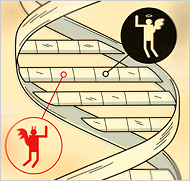Moral Minds
 New York Times
New York TimesOctober 31, 2006
Books on Science
An Evolutionary Theory of Right and Wrong
By NICHOLAS WADE
Who doesn’t know the difference between right and wrong? Yet that essential knowledge, generally assumed to come from parental teaching or religious or legal instruction, could turn out to have a quite different origin.
Primatologists like Frans de Waal have long argued that the roots of human morality are evident in social animals like apes and monkeys. The animals’ feelings of empathy and expectations of reciprocity are essential behaviors for mammalian group living and can be regarded as a counterpart of human morality.
Marc D. Hauser, a Harvard biologist, has built on this idea to propose that people are born with a moral grammar wired into their neural circuits by evolution. In a new book, “Moral Minds” (HarperCollins 2006), he argues that the grammar generates instant moral judgments which, in part because of the quick decisions that must be made in life-or-death situations, are inaccessible to the conscious mind....
The proposal, if true, would have far-reaching consequences. It implies that parents and teachers are not teaching children the rules of correct behavior from scratch but are, at best, giving shape to an innate behavior. And it suggests that religions are not the source of moral codes but, rather, social enforcers of instinctive moral behavior.
Both atheists and people belonging to a wide range of faiths make the same moral judgments, Dr. Hauser writes, implying “that the system that unconsciously generates moral judgments is immune to religious doctrine.” Dr. Hauser argues that the moral grammar operates in much the same way as the universal grammar proposed by the linguist Noam Chomsky as the innate neural machinery for language. The universal grammar is a system of rules for generating syntax and vocabulary but does not specify any particular language. That is supplied by the culture in which a child grows up.
The moral grammar too, in Dr. Hauser’s view, is a system for generating moral behavior and not a list of specific rules. It constrains human behavior so tightly that many rules are in fact the same or very similar in every society — do as you would be done by; care for children and the weak; don’t kill; avoid adultery and incest; don’t cheat, steal or lie.
But it also allows for variations, since cultures can assign different weights to the elements of the grammar’s calculations. Thus one society may ban abortion, another may see infanticide as a moral duty in certain circumstances. Or as Kipling observed, “The wildest dreams of Kew are the facts of Katmandu, and the crimes of Clapham chaste in Martaban.”
Matters of right and wrong have long been the province of moral philosophers and ethicists. Dr. Hauser’s proposal is an attempt to claim the subject for science, in particular for evolutionary biology. The moral grammar evolved, he believes, because restraints on behavior are required for social living and have been favored by natural selection because of their survival value....
The moral grammar now universal among people presumably evolved to its final shape during the hunter-gatherer phase of the human past, before the dispersal from the ancestral homeland in northeast Africa some 50,000 years ago. This may be why events before our eyes carry far greater moral weight than happenings far away, Dr. Hauser believes, since in those days one never had to care about people remote from one’s environment....
Dr. Hauser believes that the moral grammar may have evolved through the evolutionary mechanism known as group selection. A group bound by altruism toward its members and rigorous discouragement of cheaters would be more likely to prevail over a less cohesive society, so genes for moral grammar would become more common.
Many evolutionary biologists frown on the idea of group selection, noting that genes cannot become more frequent unless they benefit the individual who carries them, and a person who contributes altruistically to people not related to him will reduce his own fitness and leave fewer offspring.
But though group selection has not been proved to occur in animals, Dr. Hauser believes that it may have operated in people because of their greater social conformity and willingness to punish or ostracize those who disobey moral codes.
“That permits strong group cohesion you don’t see in other animals, which may make for group selection,” he said....


Comments
Post a Comment